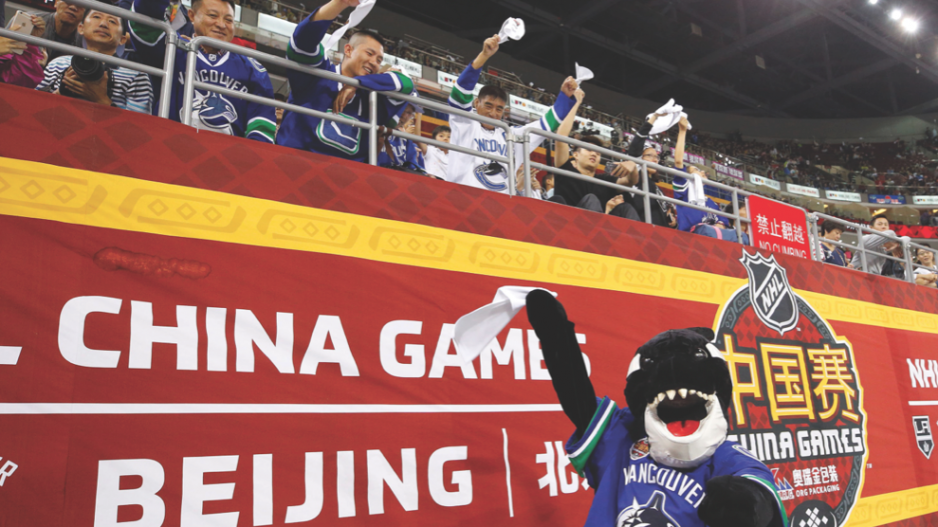Jeff Stipec wasn’t sure what to expect when he and the Vancouver Canucks left in mid-September for a whirlwind one-week trip to China as part of a two-game exhibition series against the Los Angeles Kings.
But by the time Stipec, COO of Canucks Sports & Entertainment, returned from Beijing on September 24 with the team, he was convinced – hockey can thrive in China, and the Canucks executive expects the Vancouver club to be a big part of that process.
“We were coming home, and on the plane; we weren’t tired,” Stipec said. “We were energized.… We met with several Chinese business people and key sponsors, and these weren’t guys who liked hockey when they were growing up. They were drawn to the game more recently. To hear their passion, and for them to turn to hockey with the type of investment they are making in the sport, it was really encouraging.”
The National Hockey League’s (NHL) first direct foray into China – a pair of games between the Canucks and Kings in Beijing and Shanghai – ended with two Vancouver losses. But the games are part of a potentially bigger long-term victory: hockey winning the hearts of fans in a country with 1.4 billion people, in the thrall of a push for winter-sports participation ahead of Beijing’s hosting of the 2022 Winter Games.
In what Chinese state media calls a “golden age” for winter sports in the country, Beijing plans to get 300 million people to take part in sports like hockey and skiing by 2022. Officials plan to create an industry that reaches 600 billion renminbi ($113 billion) by 2020. Local minor hockey clubs are already reporting a 10-fold increase in participation among Beijing youth, one report said.
It’s with this backdrop that the Canucks organization – playing in a metropolitan market with close to 400,000 Canadians of Chinese origin – sees itself in a prime business position to appeal to a new demographic of fans, especially those who might live in China but have links to Vancouver or B.C.
Stipec said the team has already been in China, holding youth hockey camps in the country as part of its grassroots outreach program in the last three years. But he added that the experience of the Chinese market first-hand has strengthened the hockey club’s conviction in developing that market further.
“I’d say that’s one of the top strategies internally, and that’s to really grow our Chinese fan base.”
Stipec added that the Canucks have already earmarked the February 17 game against the Boston Bruins as a Lunar New Year celebration.
Because the overall professional hockey promotion efforts in China itself will be spearheaded by the NHL head office in New York, Stipec said the Canucks will be focusing either on further grassroots initiatives in China or on local engagement efforts for new Canadians from China already in the Metro Vancouver area. One such effort – a minor hockey development tournament in B.C. scheduled for early 2018 – will invite up to eight atom-aged hockey teams from China to participate.
The focus on youth is intentional. Stipec noted the heavy presence of children at both exhibition games in China.
“I think it’s a great challenge [to sell the game in China], and it’s not going to happen in two to three years,” he said. “But those young kids at the game two weekends ago, they are seven to nine years old now. When they are in their late teens, I think they will be the ones driving the hockey machine in China.… For the Beijing game, there was great energy in the arena, and a lot of that was driven by the youthful enthusiasm brought by the kids in attendance.”
There is evidence that Vancouver’s heavy interactions with China – whether through international students, tourists or simply immigration – are already giving the Canucks a leg up. Stipec noted that he saw Canucks jerseys in the crowd outnumber Kings jerseys by a rough ratio of 5-1 at both games, which he believes speaks to the brand already having a place among Chinese hockey fans.
But there are still hurdles ahead. Stipec said many fans stood up to leave at the end of the second period, thinking the game was played in two halves. But he added that he was surprised at how quickly fans picked up major concepts in the game.
“Whether it’s a breakaway, a three-on-two or a two-on-one forming, they have this sense that something special is about to happen. You can feel the excitement, which surprised me. I lived in Arizona through the early years of the Coyotes in that market, and even then, the level of understanding [for the game] wasn’t as high as what I felt in China.”
The main challenge for the game to spread further in China, he said, is the availability of ice time in a country with fewer than 200 indoor rinks as of last year. But with the 2022 Winter Olympic Games spurring government funding, Stipec said the future is bright.
“Speaking as a hockey fan, I was taken by the fact that when the Chinese audience goes to the games, they go to the games. Chinese fans in both Shanghai and Beijing were so excited to be at the game that it’s not about what’s going on in the concourse.
“In fact, in Beijing, there’s no beer in the facility at all. It’s a sporting event. People go there for the joy of the sport, and that was really neat to see. Like a lot of Canadians, I certainly enjoy beer, but to see that culturally … that was really an ‘aha’ moment for me.” •




